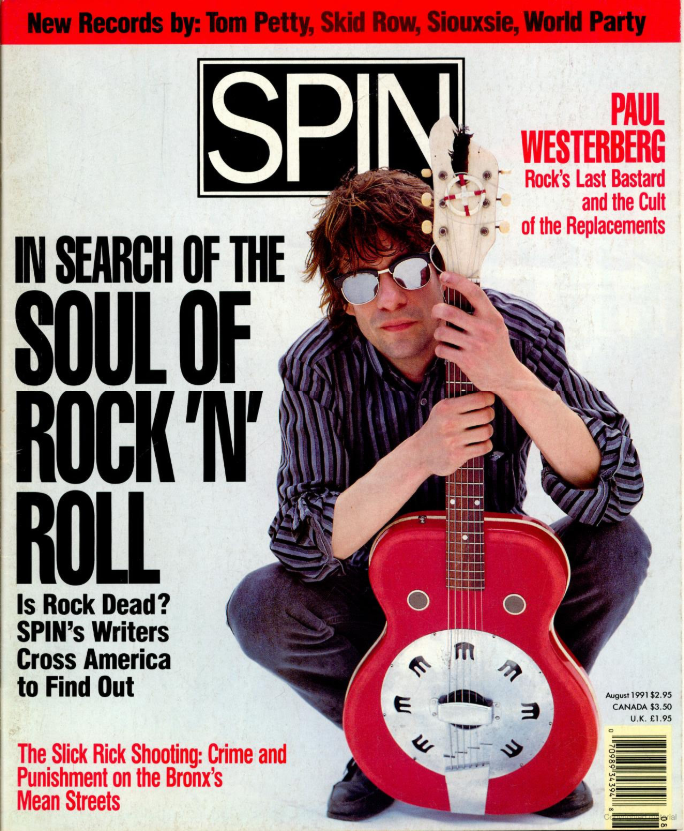
Google Books has archived every issue of SPIN, which is what my original post was going to be about. Then I started digging around in an old issue from the summer after I graduated college (August, 1991), and rediscovered an excellent Paul Westerberg interview. Apparently, rock has always been on the verge of imminent collapse, to quote the man himself. We bastards were just the other day discussing rock’s back seat in pop culture, and this edition of SPIN is 27 years old! Anyhoo, I was amused by this …
SPIN: Is rock dead?
Westerberg: Well, is jazz dead? That’s the way I look at it. Rock ‘n’ roll is underground once again, but it won’t die, just like jazz won’t. It’s not the popular music of the day, but it’s not dead.
A little later, the interviewer asks if Elvis was king, which leads to this exchange …
SPIN: What about somebody like Alex Chilton? You made him a rock hero in your song.
Westerberg: No. I don’t know what Alex represents. Now I listen to his new Rhino compilation, and it’s like, I can’t make up my mind whether Alex is some brilliant chameleon or just a guy who fucking lost it real quick. I almost regret writing that song. It’s sad, because kids will come and ask me about Alex and you’ll see this look in their eyes, and they think he’s some guy in leather pants that jumps from amplifiers or something. It’s like, if they only knew.

Alex didn’t represent anything but Alex. He usually just played whatever the fuck he felt like playing at the moment, without caring much what anyone thought of it.
Do you think it was because he was so demoralized by the music industry during his time with The Box Tops that he later gave zero fucks? I remember reading an interview with one of the guys from The Posies, who said Alex was once asked what it was like playing in such a big band when he was still a kid. Auer or Stringfellow (can’t remember which) said Chilton’s usual calm, cool, collected demeanor cracked as he just kept repeating “it sucked” over and over, gradually turning into The Hulk.
Well, he did care about what he played, just not what people thought of it. It’s more complicated than bitterness towards the music business. He was out of step with the times as far back as late 60’s/early 70’s with the popular shift towards guitar god-driven cock rock. The fate of Big Star made that obvious. Journalists like to say that Stax undermined Big Star, which is only true to an extent. Even if they’d had good label support, they would not have sold that many records. Most people at the time just didn’t care about hearing jangle-pop. So his attitude was cynicism about the music business aggravated by being a perennial artistic anachronism, always ahead and behind the dominant trends.
That said, Alex presented an interesting mixture of bitter cynic and excitable kid. He loved songs and loved performing them, which was part of his charisma. His excitement about a project could even overwhelm his cynicism. When he was producing the Cramps, he told me it would make him rich. Also, when he started working on Sister Lovers, his idea was to record some hits. There was no way either of those projects would sell many records back then. I mention this to point out that despite his reputation as a contrarian crank, he did have a kind of innocent excitement unaffected by the disappointments.
Insightful as ever, Mr. Renfield.